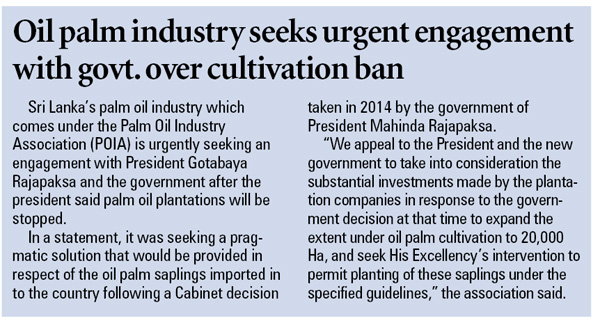Palm oil has tremendous impact on environment
The government or any authority do not have any prerogative power to allow the environment to be destroyed as it is the duty of all to preserve for the future generation in keeping with the provisions of the Constitution, according to Ravindranath Dabare, Attorney at Law and Chairman, Centre for Environmental Justice.
He was speaking at an intellects’ discussion on ‘Coconut Oil and Palm Oil’ recently at the Colombo auditorium of the Organisation of the Professional Associations (OPA). This meeting was held prior to President Gotabaya Rajapaksa’s announcement, during the policy statement made at the new session of Parliament, that palm oil plantations will be discontinued forthwith.
Mr. Dabare said that there is ample evidence that palm oil cultivation and the unchecked negative use of palm oil have a tremendous impact on the environment and serious impact on the health of the people of many countries as around 80 per cent of palm oil is mixed in coconut oil and sold in the local market today.
He categorically pin pointed that there are enough and effective laws enacted in the country to prevent this impact and punish the culprits once the illegality is proved and there are even clear constitutional provisions. He said that the palm oil cultivation and use of palm oil violates a number of laws in this country.
While there is clear provision under section 17 of Chapter 27 of the Constitution it is very strange to note why appropriate remedial action is not taken by the authorities which showed that these authorities are negligent of their service by the people.
Therefore, he pointed out that it is the bounden duty of the governing authority to take all steps to preserve the environment for the future generation as provided for by the Constitution.
He said that the soil protection, wild life protection, bird life protection and several other environmental protections comes under the purview of the Central Environmental Authority. The government and other authorities are only incumbent to protect the environment for the future generations, he asserted.
So, in such circumstances, if any party or person wilfully acts to destroy the environment, the government or any other relevant authority do not have power to allow such destructive attitudes, he lamented.
Maj Gen (Rtd) D.M.S. Dissanayaka, Chairman, Consumer Affairs Authority (CAA), spoke of how he was involved in the 30-year old war but did not speak of the responsibility that rests with the CAA in preventing the adulteration of coconut oil with palm oil.
Instead he described as to how during the war the coconut cultivation in the war-torn areas was completely destroyed. First the blossomed top of the tree was destroyed with mortars etc and then gradually destroyed the trunk until they totally fell to the ground. He said that the ‘enemy’ and the army felled the palmirah and coconut trees to put up their bunkers.
Prof. Ravindra Vichanachchi, Lecturer, Dept of Humanities, Sri Jayawardenepura University, said that coconut has very strong resistance properties which could prevent infection of COVID-19 as it appears that those countries which use coconut extensively are immune to contracting the virus. In this sphere he said that Sri Lanka did not get this advantage as the coconut oil is adulterated with palm oil.
He said that palm oil is made out of the whole fruit, a major part of which consists of its husk and its kernel whereas coconut oil is made of the kernel and no husk is involved. He said that extensive research showed coconut oil contains chloric acid which is not present in palm oil whereas coconut is good for the health but palm oil is not according to research.
Dr. Wasantha Gunatilleke, Faculty of Agriculture, Wayamba University, speaking on the damage caused by the palm oil issue said that Sri Lanka has involved in some unnecessary things, such as Eucalyptus, pine and palm cultivation all of which are injurious to nature and in turn affect the human life.
The palm tree first came to Sri Lanka in 1968 and palm oil came in 1996 and said that while there was around 9000 palm tree growth in the country, and in 2015 government decided to plant 20,000 hectares, but he said that fortunately the cultivation has become low now.
He said that the palm tree growth is injurious to the soil, precious ground water table and indicated that a palm tree sucks around 400 to 600 litres of water, but a coconut tree evaporates only 60 litres.
The discussion was organised by the Government Medical Officers Association, Coconut growers Association and several other organisations.



